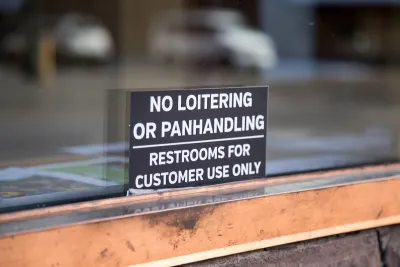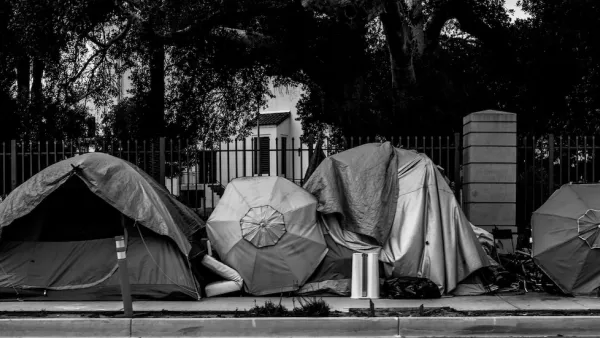Policies that punish and fine unhoused people for sheltering outdoors, even when other shelter is not available, are the most visible but least efficient ways to reduce homelessness.

In an opinion piece for Bloomberg Law, Will Knight argues that “using jailing sentences and criminal fines to address homelessness is ineffective and fundamentally unjust,” calling criminalization an “expensive and shortsighted” policy.
Knight makes the argument in anticipation of the U.S. Supreme Court’s imminent decision on Grants Pass v. Johnson, a case that will decide whether states and cities can criminalize unhoused people that stems in Grants Pass, Oregon, where the city issued $300 fines to people sleeping outside even though housing is practically unavailable and there is no emergency shelter.
“Although evidence shows criminalization to be the most expensive and least effective method, it remains the preferred policy. The hidden costs of this approach—policing, jailing, and clogging courts, not to mention the barriers it creates for individuals seeking housing due to fines or criminal records—are substantial.”
For Knight, “A Supreme Court ruling affirming that people shouldn’t be punished for trying to survive could encourage lawmakers to prioritize actual long-lasting solutions. These solutions should focus on ensuring housing is safe and affordable, rather than rely on punitive measures that don’t address the underlying issues.”
FULL STORY: The US Supreme Court Should End Criminalization of Homelessness

National Parks Layoffs Will Cause Communities to Lose Billions
Thousands of essential park workers were laid off this week, just before the busy spring break season.

Retro-silient?: America’s First “Eco-burb,” The Woodlands Turns 50
A master-planned community north of Houston offers lessons on green infrastructure and resilient design, but falls short of its founder’s lofty affordability and walkability goals.

Delivering for America Plan Will Downgrade Mail Service in at Least 49.5 Percent of Zip Codes
Republican and Democrat lawmakers criticize the plan for its disproportionate negative impact on rural communities.

Test News Post 1
This is a summary

Test News Headline 46
Test for the image on the front page.

Balancing Bombs and Butterflies: How the National Guard Protects a Rare Species
The National Guard at Fort Indiantown Gap uses GIS technology and land management strategies to balance military training with conservation efforts, ensuring the survival of the rare eastern regal fritillary butterfly.
Urban Design for Planners 1: Software Tools
This six-course series explores essential urban design concepts using open source software and equips planners with the tools they need to participate fully in the urban design process.
Planning for Universal Design
Learn the tools for implementing Universal Design in planning regulations.
EMC Planning Group, Inc.
Planetizen
Planetizen
Mpact (formerly Rail~Volution)
Great Falls Development Authority, Inc.
HUDs Office of Policy Development and Research
NYU Wagner Graduate School of Public Service





























